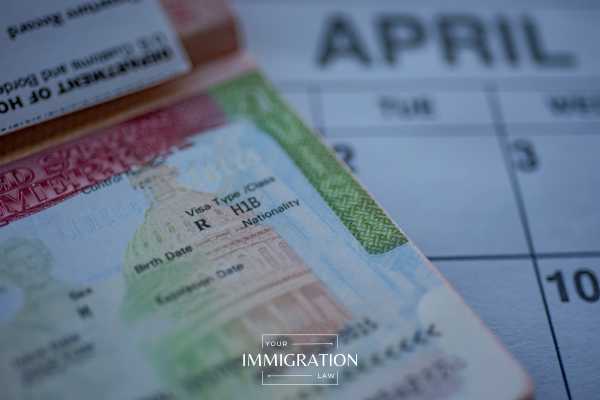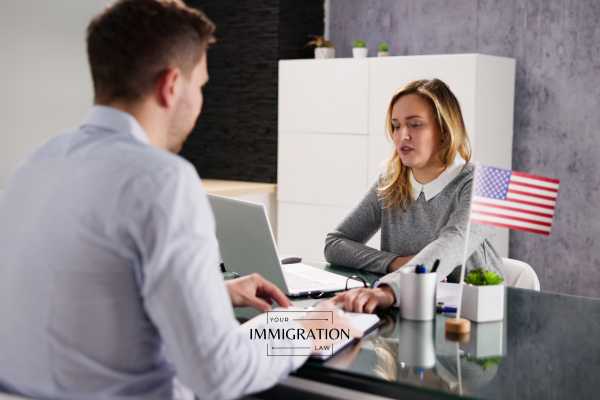The H-1B visa is a popular option for foreign workers in specialty occupations, allowing them to work in the U.S. temporarily. This visa is ideal for professionals in specialty fields. Examples of specialty occupations are IT, engineering, healthcare, and finance. However, the application process can be highly competitive and involves meeting strict eligibility criteria. A knowledgeable H-1B visa lawyer can help you navigate the complexities of the application, ensuring that your petition is properly prepared and submitted on time.
Whether you’re an employer looking to hire foreign talent or an individual seeking an H-1B visa, having legal guidance is essential for a successful outcome. Contact an experienced H-1B visa attorney today at 313-631-8080 to get the support you need throughout the application process and increase your chances of approval.
Eligibility Requirements for the H-1B Visa
The H-1B visa is a nonimmigrant visa that allows U.S. employers to temporarily employ foreign nationals in specialty occupations. To qualify for an H-1B visa, both the employer and the applicant must meet specific criteria. Here’s an overview of the key eligibility requirements:
- Specialty Occupation: The position offered must be in a H-1B specialty occupation, which generally requires at least a bachelor’s degree or its equivalent in a specific field. Specialty occupations include roles in fields such as engineering, IT, medicine, law, and finance.
- Educational and Professional Qualifications: The applicant must hold at least a bachelor's degree or its equivalent in a field related to the job. In some cases, extensive work experience in the field may be considered equivalent to a degree. For instance, three years of specialized work experience can sometimes be substituted for one year of higher education.
- Employer Sponsorship: A U.S. employer must sponsor the H-1B applicant. The H-1B dependent employer must file a Labor Condition Application (LCA) with the U.S. Department of Labor (DOL) and demonstrate that they will pay the required wage for the position, which must be at least the prevailing wage for similar jobs in the area.
- Labor Condition Application (LCA): The prospective employer must obtain an approved application for labor certification from the Department of Labor. The LCA confirms that the employer will provide wages and working conditions comparable to those offered to U.S. workers and that hiring a foreign national will not adversely affect U.S. workers' working conditions.
- Valid Employment Offer: The applicant must have a valid, full-time job offer from a U.S. employer for this immigration process. The job offer should align with the H-1B visa requirements for a specialty occupation and meet the visa’s conditions.
- Visa Cap and Exemptions: The H-1B visa is subject to an annual cap. As of recent updates, there is a H-1B cap of 65,000 new visa petitions each fiscal year, with an additional 20,000 visas reserved for applicants with advanced degrees from U.S. institutions. Certain employers, such as institutions of higher education and nonprofit organizations, are exempt from this.
- Applicant’s Immigration History: Applicants must not have violated U.S. immigration laws and must have a clean record. Immigration issues such as overstaying a previous visa or other immigration violations can affect eligibility and permanent residency.
- Documentation: Applicants and employers must provide comprehensive documentation to support the visa application. This includes evidence of the job offer, the applicant’s qualifications, the employer’s business operations, and compliance with all visa regulations. This is something that experienced immigration lawyers can assist with during your initial consultation.

Overall, the H-1B visa process involves detailed documentation and adherence to specific criteria. Applicants and employers should ensure that all requirements are met and consult with an immigration law firm if needed to navigate the complexities of the application process.
The H-1B Visa Application Process
The H-1B visa application process involves several key steps that both the employer and the prospective employee must navigate. This process begins with securing a job offer in a specialty occupation and ends with the U.S. Citizenship and Immigration Services (USCIS) issuing the visa if approved. Here’s a breakdown of the process.
Step 1: Employer’s Job Offer and Labor Condition Application (LCA)
To begin the H-1B visa process, a U.S. employer must first offer a job to a foreign worker in a specialty occupation. For the degree requirement, the job will require at least a bachelor's degree or its equivalent in a specific field, such as engineering, IT, or finance.
Once a job offer is secured, the American employer must file a Labor Certification Application (LCA) with the U.S. Department of Labor (DOL). The LCA certifies that the employer will pay the required wage for the position and that hiring a foreign professional will not adversely affect U.S. workers.
Step 2: Filing the H-1B Petition
After the LCA is approved, the employer can file Form I-129, Petition for a Nonimmigrant Worker, with USCIS. This petition must include supporting documentation, such as the job offer letter, the applicant’s educational qualifications, and proof that the position qualifies as a specialty occupation and that the applicant has exceptional abilities for the position. The petition also requires filing fees, which vary depending on the size of the company and other factors.
If the number of H-1B petitions exceeds the annual cap, the application may be subject to the H-1B lottery. If selected in the random lottery, USCIS will begin processing the petition. If not selected, the petition is returned to the employer along with any filing fees.
Step 3: USCIS Processing and Approval
Once the petition is selected and processed, USCIS will review the application and supporting documents. If everything is in order, USCIS will approve the petition. After approval, USCIS will issue a Notice of Approval (Form I-797).
The worker can then execute the visa filing at a U.S. Embassy or Consulate in their home country. The consular processing involves an interview, during which the applicant must demonstrate that they meet the requirements for the visa.
Step 4: Consular Processing and Visa Issuance
If the H-1B petition is approved, and the visa interview goes well, the U.S. Embassy or Consulate will issue the H-1B visa. The applicant can then travel to the U.S. and begin working in the specialty occupation for the sponsoring employer. The visa is typically granted for an initial period of employment of up to three years, with the possibility of an H-1B extension due to the Twenty-First Century Act.
The H-1B visa application process is complex and highly competitive, particularly due to the annual cap and H-1B lottery process. Employers and prospective H-1B employees should be well-prepared and diligent in meeting all deadlines and requirements to maximize their chances of success.
How long does it take to get an H-1B visa?
The timeline for obtaining an H-1B visa can vary as it is a more complex visa application process, but it typically takes several months, depending on the various steps involved. Here's a breakdown of roughly how long each step takes:
- Labor Condition Application (LCA) Approval: Before the initial filing of the H-1B petition, the employer must submit an LCA to the U.S. Department of Labor. This usually takes about one to two weeks for approval.
- H-1B Petition Filing and Lottery: The employer can file the H-1B petition (Form I-129) once the LCA is approved. If the number of H-1B filings exceeds the cap restrictions, a lottery is conducted to determine which petitions will be processed. The H-1B random selection process can take a few weeks.
- USCIS Processing Time: Once the petition is selected in the lottery, USCIS typically takes three to six months to process the initial application. Premium processing is available for an additional fee, which guarantees a response within 15 calendar days.
- Consular Processing: After the petition is approved, the applicant must schedule a visa interview at a U.S. Embassy or Consulate. Consular processing can take several weeks to a few months, depending on the location and appointment availability.

Overall, the H-1B visa process can take anywhere from four to eight months or longer, depending on various factors such as USCIS processing times, lottery results, and consular availability. Using premium processing can shorten the wait time significantly, but other steps in the process remain variable.
H-1B Visa Cap and Lottery Process
The H-1B visa cap limits the number of visas available each year, making the process highly competitive. Due to the demand, a lottery system is used to randomly select applicants for processing when the cap is exceeded:
Visa Cap for H1-B's
The H-1B visa program imposes an annual cap on the number of new visas issued. Each fiscal year, 65,000 H-1B visas are available under the general cap. An additional 20,000 visas are reserved for individuals with a master’s degree or higher from a U.S. institution, known as the “Master’s Cap.”
Certain employers, such as institutions of higher education, non-profit research organizations, and governmental research organizations, are exempt from the cap, allowing employees of these organizations to avoid the annual limits.
The H1-B Lottery Process
When the number of H-1B petitions exceeds the available visas, a lottery system is used to select which petitions will be processed. The lottery occurs in two phases. First, petitions that are not eligible for the advanced degree exemption are entered into the regular cap lottery.
Second, petitions for individuals with a U.S. master’s degree or higher are entered into a separate lottery for the additional 20,000 visas. The lottery system ensures a fair process when demand exceeds supply.
Compliance Requirements to Keep an H1-B Visa Status
Maintaining H-1B visa status requires both the employer and the employee to comply with specific legal obligations. Failure to adhere to these requirements can result in the visa being revoked or the employee losing their legal status in the United States.
Employer Responsibilities
Employers play a crucial role in maintaining an employee’s H-1B status by adhering to specific legal responsibilities. Employers must abide by the following terms:
- Wage and Working Conditions: Employers must pay the H-1B employee the required wage, which is either the prevailing wage for the position in the geographic area or the actual wage paid to similarly qualified workers. Additionally, employers must provide working conditions that do not adversely affect the working conditions of U.S. employees.
- Notification of Changes: If there are any significant changes in the terms and conditions of the employee's job—such as a change in job duties, location, or salary—the employer must file an amended petition with USCIS. This ensures that the H-1B worker remains compliant with their visa requirements.
- Labor Condition Application Compliance: Employers must comply with the terms set forth in the Labor Condition Application (LCA), including posting notices at the worksite to inform other workers about the presence of an H-1B employee. Employers must also maintain public access files containing documentation related to the LCA.
- Recordkeeping and Reporting: Employers are required to keep detailed records related to the H-1B employment, including payroll records and evidence of compliance with the LCA. If the employment is terminated before the H-1B period ends, the employer must notify USCIS and provide the employee with the cost of return transportation to their home country.
Employee Responsibilities
Employees on an H-1B visa must meet certain responsibilities to maintain their status. This includes complying with:
- Maintaining Job Status: The H-1B visa holder must remain employed with the sponsoring employer in the job that was approved by USCIS. If the employee is terminated or leaves the job, they must find a new employer willing to sponsor their visa or leave the United States.
- Stay Within Approved Scope of Employment: The employee must work in the position and location specified in the H-1B petition. Any changes in job duties, location, or salary must be approved by USCIS through an amended petition.
- Travel Restrictions: If the H-1B employee plans to travel outside the United States, they must ensure that their visa stamp is still valid for re-entry. If the visa has expired, they will need to apply for a new visa at a U.S. consulate abroad before returning to the United States.
- Status Extensions: H-1B visa holders must ensure that their visa is valid and apply for extensions if necessary. The initial H-1B visa is typically granted for three years and can be extended for an additional three years. If the visa is close to expiring, it’s crucial to apply for an extension before the current visa expires to avoid being out of status.

Compliance with these requirements is crucial to maintaining H-1B visa status. Both employers and employees must stay aware of these obligations to avoid potential issues that could lead to visa revocation or other penalties.
Need Help with Your H-1B Visa? Contact a Lawyer Today
Navigating the H-1B visa process can be challenging, but with the right legal guidance from a professional who has experience in immigration law, you can increase your chances of success. A skilled US work visa attorney can help you avoid common pitfalls and ensure your application is handled efficiently.
Ready to get started? Contact an H-1B visa attorney today at Your Immigration Law to discuss our legal services and take the next step toward achieving your professional goals in the U.S.